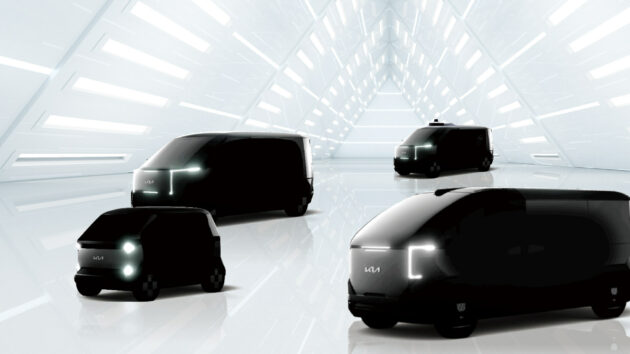
Kia starts building facility for electric purpose-built vehicle (PBV) production
by CM Staff

The new PBV plant will be built as an eco-friendly plant that applies future innovative manufacturing technologies while minimizing carbon emissions.

Kia starts building facility for electric purpose-built vehicle (PBV) production (PRNewsfoto/Kia Corporation)
SEOUL — Kia held a ceremony on Apr. 11 for its dedicated plant for the production of battery-electric purpose-built vehicles (PBV). The ceremony was held at Kia’s Hwaseong plant, located in Gyeonggi Province, South Korea, and was attended by over 200 people, including government officials, Hyundai Motor Group Executive Chair Euisun Chung, Kia’s Global President and CEO Ho Sung Song, and other employees from Hyundai Motor Group and the automotive parts industry.
Kia President and CEO Ho Sung Song, on behalf of Hyundai Motor Group, highlighted in a greeting, “Hyundai Motor, Kia, and Hyundai MOBIS together plan to invest KRW 24 trillion in the domestic electric vehicle industry by 2030, with the goal of making South Korea one of the top three players in the global EV market. Our focus is to enhance the competitiveness of the entire electric vehicle ecosystem, including research and development, production, and infrastructure, and to lead the way in driving change and innovation in the new global automotive industry.”
Kia will invest around one trillion won (approximately USD 758 million) to secure 99,000 acres of land, with the company planning to start mass-production in the second half of 2025. It plans to produce 150,000 units in the first full year, with the potential to expand in line with future market conditions.
The new PBV plant will be built as an eco-friendly plant that applies future innovative manufacturing technologies while minimizing carbon emissions. It will also seek efficiency and intelligence with Hyundai Motor and Kia’s smart factory brand ‘E-FOREST technologies’ such as digital manufacturing systems.
One of the manufacturing processes to be implemented at the new PBV plant is known as the ‘cellular (or cell) method,’ which allows vehicle production based on diverse customer demands.
The cell method is a process layout strategy that groups together machines or workstations that are used to produce similar products or parts. The goal of the cell method is to create a more efficient and flexible manufacturing process by reducing the distance that materials and products need to travel during production. Under the cell method, machines are arranged in a way that optimizes the flow of materials and products between workstations, with the aim of minimizing downtime, reducing costs and increasing productivity.
The PBV plant’s manufacturing system unifies the new cell method with the original mass-production conveyor system to allow flexible production with more customization of various product types.
In addition, the PBV plant will be built as a low-carbon factory by operating a dry booth, a nature-friendly construction method, during the painting process of vehicle manufacturing, and reducing carbon emissions by about 20 percent compared to existing factories by utilizing natural light and streamlining the manufacturing process.
The new facility will be a ‘human-friendly’ plant by pushing automation in heavy-duty work and tasks that require looking up at the ceiling, while enhancing the feeling of ‘openness’ and also reducing noise levels.